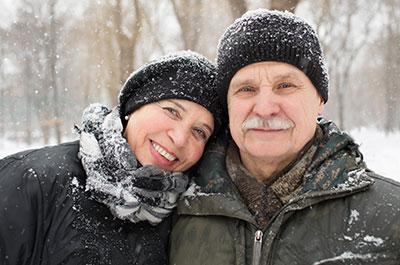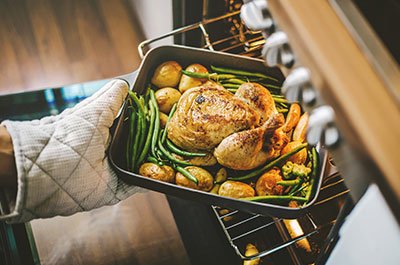The holidays are upon us, and between visits with family and friends, holiday feasts, shoveling snow, and all those sales at the mall, make sure you are taking time to keep your heart healthy - especially because heart problems are more common during the holidays.
Heart attacks, strokes, atrial fibrillation (or AFib), heart failure (CHF) and other heart-related conditions are more prevalent around this time of year. In fact, the American Heart Association found that heart-related mortality is at an all-time high during the holiday season. There are several reasons that contribute to this increase in heart problems. Benjamin Swanson, M.D., a cardiologist with Henry Ford Health, shares the most common contributors.
1. Stress
Did you prepare enough food? When will you find time to clean? Are you ready to entertain friends and family? No matter your plans for the holidays, there will always be a least a few stressful moments. Emotions can reach an all-time high – especially if you are dealing with family issues, financial pressures or adjusting to changes after a birth or death. Learning how to relax can lower your blood pressure, slow your heart rate and relax tense muscles.
The solution: Take some deep breaths. If you know you will be stressed shopping or preparing for a party, plan ahead so you have less to worry about the day of. Make sure to get plenty of sleep, focus on eating healthy and take time to exercise so you are ready to take on the year-end celebrations. If you find yourself stressing about more serious life issues, talk with your doctor.
2. Overexertion
It can be easy to overwork yourself by running from store to store, trying to keep up with plans, putting up decorations and even shoveling snow. Being active and working out is good for your heart, but doing too much amid cold weather can put extra strain on your heart.
The solution: Try delegating tasks and don’t be afraid to ask for help. You could ask relatives and friends to bring dishes to a holiday party. Be aware of your schedule and don’t pack the next few weeks with too many plans. It’s okay to turn down invites – especially for relaxing nights in – or to take tasks off your own to-do list if they’re not truly necessary.
“If you’re not used to physical exertion, be careful shoveling snow,” warns Dr. Swanson. “You’re likely to be unaware of just how much you’re exerting yourself with the cold temperatures and multiple layers – it puts yourself at risk for a heart attack.”
3. Overeating unhealthy foods
Holidays are often centered around the food. It is easy to forget about serving size when you want to try everything. “The problem is that many common holiday foods are high in salt, saturated fat or sugar,” says Dr. Swanson. “This can increase your blood pressure, blood sugar and cholesterol levels.” Over time, this can lead to diabetes and heart disease. Additionally, when your body tries to digest a large amount of food, it overworks your system and increases your heart rate.
The solution: Try bringing a healthy side dish (like a salad or a modified version of a classic) to your next gathering. Remember serving sizes next time you grab your plate for holiday dinner. Keep your plate filled with mostly protein and veggies, and eat slowly to give your body time to digest. If you can’t pass over a favorite dish, take a small serving.
4. Excessive alcohol consumption
While an occasional alcoholic beverage may be fine to enjoy during festivities, too many drinks can cause the heart to beat irregularly. Alcohol can weaken heart muscles and cause more pressure on the heart. “Holiday heart syndrome is a term used to describe the increase in arrhythmias such as atrial fibrillation or other irregular heart rhythms that doctors see around the holidays – typically from drinking too much alcohol,” says Dr. Swanson.
The solution: Limit the number of drinks you consume. It can be easy to drink more than usual in social situations, but that is no excuse for not staying in control. Only drink alcohol with a meal instead of casually drinking all night. Or switch up every other drink with a glass of water or sparkling water.
How To Respond To And Prevent Holiday-Related Heart Problems

When faced with any of the above factors, be aware of how your actions might affect your heart. Don’t be quick to dismiss chest pain as heartburn because it might be a heart attack. Other heart attack symptoms to look out for include:
- Chest pain or tightness
- Excessive fatigue
- Pain in the arms, jaw or neck
- Dizziness or a headache
- Nausea or vomiting
“Be aware of other cardiac symptoms such as palpitations/irregular heartbeats, shortness of breath, leg swelling, early fatigue and sudden loss of consciousness,” says Dr. Swanson.
It’s also a good idea to take steps to protect your heart well before the holidays arrive. Make sure to get regular checkups and know your numbers, like blood pressure, cholesterol, blood sugar, body mass index (BMI) and waist circumference, to help you understand your heart risk.
Being more aware of your heart health and careful about the choices you make during the holiday season can be truly lifesaving.
Reviewed by Dr. Benjamin Swanson, a cardiologist who sees patients at Henry Ford Hospital and Henry Ford Medical Centers – Fairlane and Plymouth.



